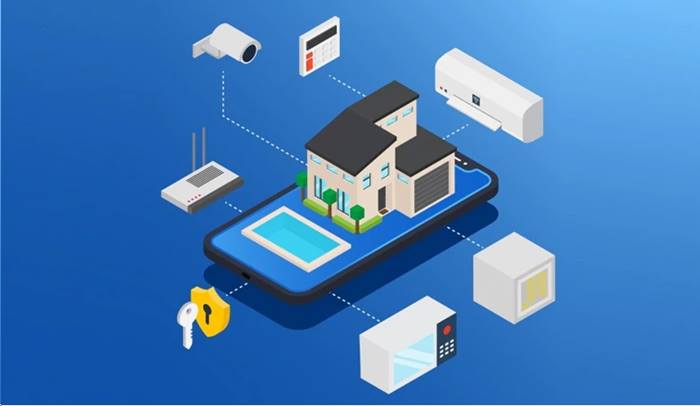The need of having a secure smart home has grown alongside the proliferation of internet-connected gadgets inside the average American home.
With the proliferation of Internet-connected devices such as smart speakers, thermostats, and more, the safety and privacy of our homes are more at risk.
This article will explore the most recent developments and trends in smart home security, as well as their impact on our personal abodes’ safety.
The most groundbreaking innovations in the field of smart home security have been the applications of AI and machine learning.
These advancements allow for the creation of more robust security systems with improved threat detection and response times.
Artificial intelligence can also be used to spot odd patterns of user behavior, which can be an early indicator of security breaches.
Because it is so difficult to copy, this method is more secure than conventional passwords or PINs.
The integration of numerous smart home appliances
Integrated and user-friendly smart home security systems are also on the rise.
The seamless integration of numerous smart home appliances now enables consumers to monitor and manage their security systems from a single app.
Further capabilities like automatic notifications and responses to potential security concerns are also made possible by this integration.
Strong passwords and updated software
There are numerous doable actions that homeowners may take in addition to these technological advancements to increase the security of their smart homes.
They should also periodically check their network for any unexpected activity and use strong passwords and updated software.
Security will undoubtedly remain a top concern for customers as the smart home market expands.
Homeowners can feel secure in their houses’ protection from potential attacks thanks to the newest developments and trends in smart home security.
Blockchain Technology
The application of blockchain technology is one aspect of smart home security that is gaining popularity.
Blockchain is a decentralized, secure, and open ledger that may be used to store and verify data.
This technology may be used to create a more secure and unbreakable record of transactions, making it ideal for smart home security.
Access control technologies and smart locks are enhancing the security of smart homes.
These systems can be utilized to limit access to a home or to certain areas within it, such as a garage or an office.
They can also be used to monitor who comes and goes from the house, providing important information regarding possible security risks.
Real-time view of homes
Another development in smart home security is the use of video surveillance systems.
With the aid of these systems, which can provide them with a real-time view of their homes, homeowners can check for any unusual behavior.
Several modern smart home security cameras come equipped with cutting-edge functions like facial recognition and motion detection, which increase their capacity to identify possible security threats.
Generally speaking, the newest developments and trends in smart home security are contributing to the creation of safer and more efficient systems that can provide homeowners with more peace of mind.
By keeping up with the most recent advancements in smart home security systems, homeowners may take proactive steps to protect their homes and loved ones from potential security threats.
Upcoming Smart Home Innovations to Watch Out For
Recent growth in the smart home sector has been phenomenal, and this expansion is only anticipated to continue. As technology advances, so does the potential for smart homes.
The top 10 trends for smart homes in the future and what to expect are:
- More Integration: As more devices are connected, we’ll see increased integration between them, resulting in a more smooth and more user-friendly smart home experience.
- Voice Control: Voice-activated smart home gadgets are becoming more common, and this development is expected to continue. Future speech recognition technologies will be increasingly sophisticated and capable of comprehending context and spoken language.
- Artificial Intelligence: Devices in smart homes will be able to learn from user behavior and adjust to their preferences thanks to AI.
- Energy Efficiency: As smart home technology advances, homeowners will be able to save money and lessen their environmental impact.
- Health and Wellness: The smart home of the future will have technologies like air quality monitoring and smart lighting that replicate natural sunlight in order to promote the health and wellness of its occupants.
- Security: Smart home security systems will grow even further, gaining more and more features like facial recognition and biometric authentication.
- Augmented and Virtual Reality – With the integration of augmented and virtual reality technologies into smart home systems, homeowners will be able to experience their homes in brand-new and creative ways.
- 5G: The introduction of 5G technology will make connectivity faster and more dependable, opening the door for even more sophisticated smart home gadgets.
- Robotics: We’ll see more sophisticated robotic gadgets that can carry out a range of activities around the home as robotics technology continues to progress.
- Sustainability: With features like solar panels and rainwater harvesting becoming increasingly common, the smart house of the future will be built with sustainability in mind.
Overall, with a number of new trends and developments in the works, the future of smart homes is bright.
The potential for smart homes will expand as technology develops, giving homeowners throughout the world access to a more connected, energy-efficient, and sustainable future.
Learn more about Smart Home Security
